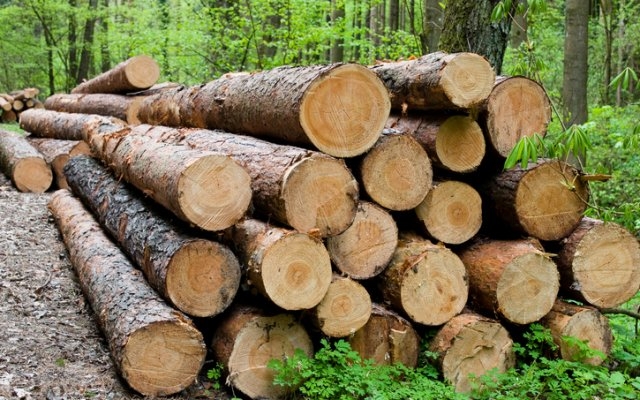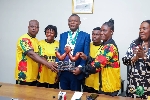Halting high-risk timber export: Is Ghana committed?
Feature Article

Till date, Ghana's timber that are exported to the European Union (EU) markets are considered as high-risk timber for which reason the nation's products have to undergo some strict due diligence before they are allowed into the EU.
This is because even though they are exported with export permit, Ghana exports the timber without a Forest Law Enforcement, Governance and Trade (FLEGT) licence, which is supposed to be a requirement that would attach some high confidence to Ghana's timber to the EU.
According to forest management experts, Ghana was supposed to have started issuing FLEGT licences way back in 2009, but it is almost a decade now there seems to be "no show" and it is still unclear when the country would start issuing FLEGT licences on timber export as a sign of fully completing the implementation of the Voluntary Partnership Agreement (VPA) which Ghana signed with the EU.
A VPA is a bilateral timber-trade agreement between the EU and a timber-exporting country outside the EU (such as Ghana). VPAs are a key element of the EU FLEGT Action Plan, which aims to address illegal logging.
Ghana set its own target to complete its VPA in 2011 but could not meet the target and pushed to 2013. That could not also materialise. In 2015, Ghana still could not meet that and hoped to have realised it in 2017. It is now May 2019 and Ghana has still not met that target.
Reasons
According to Mr. Obed Owusu-Addai, Managing Campaigner for EcoCare Ghana, in an interview, Ghana's inability to meet its target in all these years was first as a result of some technical challenges which included, no or very poor internet connectivity and electricity.
"Most of the places where Ghana's timber comes from lacked electricity and internet access," he said.
He added that some operational challenges also caused the habitual postponement of meeting the target. That is, some of the forest reserves did not have any management plan.
Is Ghana really committed to implementing its VPA? Is Ghana ready to issue FLEGT licences at all? What has the country done to prove its readiness? And if there are some commitments, what are the challenges?
Brief history of Ghana's FLEGT/VPA
Ghana began negotiations with the EU in 2005 to enter into a VPA. It completed documentations, sent to EU to approve and finally signed the VPA in the year 2008. Ghana's Parliament ratified it in 2009 and between 2009 till now Ghana, in one way or the other, has been implementing the VPA.
However, Ghana had massive challenges with its systems development partly due to the fact that the country underestimated how long it would take to develop what is called a Ghana wood tracking system. Basically, Ghana was using a paper-based approach where everything done around timber involved paper processes and contractors were very powerful because there was an interface with contractors and duty bearers.
Eventually, Ghana began the wood tracking system under the systems development, which is, migrating from paper-based approaches of documenting forest management issues to digital format where forest management officers on the field were equipped with handheld devices to collect data and upload unto the wood tracking system database.
According to information, Ghana first signed an agreement with a French company called Hervetta to manufacture the systems development technology dubbed WTS. Interestingly, information gathered indicated that those who signed the agreement probably did not read the agreement well so they signed that Hervertta would develop the WTS but would still have ownership of the technology. After development, there were some small contractual breaches which made Hervertta to invoke that clause and took the technology away. Ghana had to start the VPA implementation all over again.
Ghana went on from there and contracted another company called AMGG to develop the Ghana wood tracking system which is operational as of now.
Ghana's readiness
Mr. Obed Owusu-Addai said for now, Ghana has finished everything that it needs to do to start issuing FLEGT licence.
"Ghana has done a lot of things. It has done organisational development, trained all technical officers, all district and regional managers on how to use the new technology (the wood tracking system developed by AMGG).
He disclosed that all those places, especially in the Western corridor, where Ghana's timber emanate from have now been hooked on to the national grid with some other places connected to solar panels to address the electricity problems.
He also added that in Ghana so far, about 35 management plans have been written to handle its operational challenges.
"The problem now is on the EU side. The agreement says that when Ghana is ready it will tell the EU to do a joint assessment to ascertain Ghana's readiness. We have told the EU that we are ready. It is up to them to set a date to review Ghana's progress for a joint assessment to be done and to grant Ghana's readiness to issue FLEGT licence. That has not been done yet and we are hoping early 2019 the assessment will be done and by June 2019 FLEGT licence will begin," he explained.
Mr. Owusu-Addai also disclosed that the EU's seeming delay is because there is going to be an election at the EU to get new European Commissioners (EC) in 2019.
He said the bureaucracy within the EC is moving at a snail’s pace, making the VPA processes locked up in these bureaucratic reasons since the new commissioners would want to take the credit for helping Ghana issue the FLEGT licence.
One other serious challenge which may also delay the FLEGT licence issuing is the increasing existence of illegal logging in the country's forest sector. Already this menace is robbing Ghana of billions of cedis annually.
Mr. Owusu-Addai attested that "When Ghana signed the VPA, we included our domestic market. So the chainsaw millers who are producing for the local market are our hurdle. We have not been able to tackle it.
"When we go to the timber market almost all the timber is coming from illegal sources. Even if we issue FLEGT licence it will only be for the EU market and not for our domestic markets. Meanwhile, the agreement (VPA) says that will address both the export and domestic markets. Yet our major challenge is how to ensure domestic reform and restructuring process.
"Paper wise, Ghana is ready to issue a FLEGT licence on foreign bound consignment but for the domestic market we still have problems," he expressed. Perhaps, when Ghana begins issuing FLEGT licences, domestic reforms will eventually occur.
From every indication, Ghana is committed to completing implementation of the VPA to begin issuing FLEGT licences as it has achieved readiness. However, until the EU is done electing its new ECs, Ghana's exported timber will still be tagged as high risk timber.
By: McAnthony Dagyenga
Writer's email: [email protected]
This is because even though they are exported with export permit, Ghana exports the timber without a Forest Law Enforcement, Governance and Trade (FLEGT) licence, which is supposed to be a requirement that would attach some high confidence to Ghana's timber to the EU.
According to forest management experts, Ghana was supposed to have started issuing FLEGT licences way back in 2009, but it is almost a decade now there seems to be "no show" and it is still unclear when the country would start issuing FLEGT licences on timber export as a sign of fully completing the implementation of the Voluntary Partnership Agreement (VPA) which Ghana signed with the EU.
A VPA is a bilateral timber-trade agreement between the EU and a timber-exporting country outside the EU (such as Ghana). VPAs are a key element of the EU FLEGT Action Plan, which aims to address illegal logging.
Ghana set its own target to complete its VPA in 2011 but could not meet the target and pushed to 2013. That could not also materialise. In 2015, Ghana still could not meet that and hoped to have realised it in 2017. It is now May 2019 and Ghana has still not met that target.
Reasons
According to Mr. Obed Owusu-Addai, Managing Campaigner for EcoCare Ghana, in an interview, Ghana's inability to meet its target in all these years was first as a result of some technical challenges which included, no or very poor internet connectivity and electricity.
"Most of the places where Ghana's timber comes from lacked electricity and internet access," he said.
He added that some operational challenges also caused the habitual postponement of meeting the target. That is, some of the forest reserves did not have any management plan.
Is Ghana really committed to implementing its VPA? Is Ghana ready to issue FLEGT licences at all? What has the country done to prove its readiness? And if there are some commitments, what are the challenges?
Brief history of Ghana's FLEGT/VPA
Ghana began negotiations with the EU in 2005 to enter into a VPA. It completed documentations, sent to EU to approve and finally signed the VPA in the year 2008. Ghana's Parliament ratified it in 2009 and between 2009 till now Ghana, in one way or the other, has been implementing the VPA.
However, Ghana had massive challenges with its systems development partly due to the fact that the country underestimated how long it would take to develop what is called a Ghana wood tracking system. Basically, Ghana was using a paper-based approach where everything done around timber involved paper processes and contractors were very powerful because there was an interface with contractors and duty bearers.
Eventually, Ghana began the wood tracking system under the systems development, which is, migrating from paper-based approaches of documenting forest management issues to digital format where forest management officers on the field were equipped with handheld devices to collect data and upload unto the wood tracking system database.
According to information, Ghana first signed an agreement with a French company called Hervetta to manufacture the systems development technology dubbed WTS. Interestingly, information gathered indicated that those who signed the agreement probably did not read the agreement well so they signed that Hervertta would develop the WTS but would still have ownership of the technology. After development, there were some small contractual breaches which made Hervertta to invoke that clause and took the technology away. Ghana had to start the VPA implementation all over again.
Ghana went on from there and contracted another company called AMGG to develop the Ghana wood tracking system which is operational as of now.
Ghana's readiness
Mr. Obed Owusu-Addai said for now, Ghana has finished everything that it needs to do to start issuing FLEGT licence.
"Ghana has done a lot of things. It has done organisational development, trained all technical officers, all district and regional managers on how to use the new technology (the wood tracking system developed by AMGG).
He disclosed that all those places, especially in the Western corridor, where Ghana's timber emanate from have now been hooked on to the national grid with some other places connected to solar panels to address the electricity problems.
He also added that in Ghana so far, about 35 management plans have been written to handle its operational challenges.
"The problem now is on the EU side. The agreement says that when Ghana is ready it will tell the EU to do a joint assessment to ascertain Ghana's readiness. We have told the EU that we are ready. It is up to them to set a date to review Ghana's progress for a joint assessment to be done and to grant Ghana's readiness to issue FLEGT licence. That has not been done yet and we are hoping early 2019 the assessment will be done and by June 2019 FLEGT licence will begin," he explained.
Mr. Owusu-Addai also disclosed that the EU's seeming delay is because there is going to be an election at the EU to get new European Commissioners (EC) in 2019.
He said the bureaucracy within the EC is moving at a snail’s pace, making the VPA processes locked up in these bureaucratic reasons since the new commissioners would want to take the credit for helping Ghana issue the FLEGT licence.
One other serious challenge which may also delay the FLEGT licence issuing is the increasing existence of illegal logging in the country's forest sector. Already this menace is robbing Ghana of billions of cedis annually.
Mr. Owusu-Addai attested that "When Ghana signed the VPA, we included our domestic market. So the chainsaw millers who are producing for the local market are our hurdle. We have not been able to tackle it.
"When we go to the timber market almost all the timber is coming from illegal sources. Even if we issue FLEGT licence it will only be for the EU market and not for our domestic markets. Meanwhile, the agreement (VPA) says that will address both the export and domestic markets. Yet our major challenge is how to ensure domestic reform and restructuring process.
"Paper wise, Ghana is ready to issue a FLEGT licence on foreign bound consignment but for the domestic market we still have problems," he expressed. Perhaps, when Ghana begins issuing FLEGT licences, domestic reforms will eventually occur.
From every indication, Ghana is committed to completing implementation of the VPA to begin issuing FLEGT licences as it has achieved readiness. However, until the EU is done electing its new ECs, Ghana's exported timber will still be tagged as high risk timber.
By: McAnthony Dagyenga
Writer's email: [email protected]
Source: David Apinga






